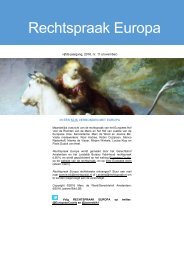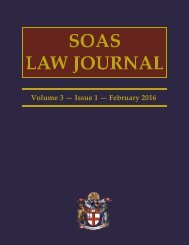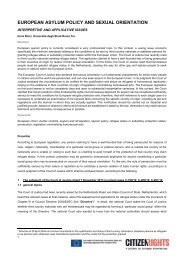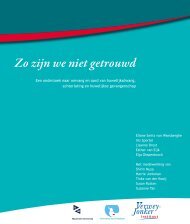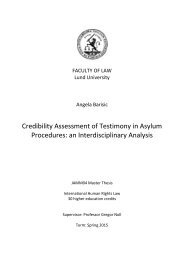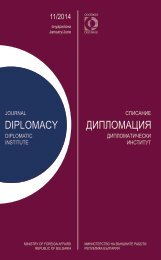AEMI
AEMI-2016-web
AEMI-2016-web
You also want an ePaper? Increase the reach of your titles
YUMPU automatically turns print PDFs into web optimized ePapers that Google loves.
170 <strong>AEMI</strong> JOURNAL 2015 2016<br />
in poor conditions in his or her home<br />
Member state, has obviously less needs<br />
than a French or German citizen. The<br />
fact that he or she is living under what is<br />
considered by the host Member state as<br />
self-sufficient does not mean that his or<br />
her needs are not fulfilled 33 . Should not<br />
the self-sufficiency criterion be based on<br />
the capacity of the mobile Union citizen<br />
to fulfill his or her needs without relying<br />
unreasonably to the host social assistance<br />
system rather than on national<br />
references based on the richness of the<br />
host country?<br />
Freedom of movement of persons in<br />
the EU is also facing a growing phenomenon<br />
as a consequence of the economic<br />
crisis: the rise of the number of<br />
one particular category of economically<br />
inactive Union citizens, non-self-sufficient<br />
Union citizens, not capable of fulfilling<br />
their own needs, such as beggars<br />
and homeless people. These persons are<br />
not benefiting from a right of residence<br />
for stays in excess of three months according<br />
to Directive 20034/38/EC. National<br />
approaches towards such category<br />
of economically inactive Union citizens<br />
vary from one State to another ranging<br />
from passive tolerance to expulsion on<br />
the ground of threat to public policy or<br />
of unreasonable burden on the social<br />
assistance system of the host Member<br />
state.<br />
The present time is not favorable for<br />
freedom of movement of economically<br />
inactive Union citizens. The recent refugee<br />
crisis is currently pulling the attention<br />
of politicians, European and national<br />
institutions and the general public away<br />
from economically inactive Union citizens.<br />
Nevertheless, we should not forget<br />
that in 2013, the Federal Minister of the<br />
Interior of Austria, the Federal Minister<br />
of the Interior of Germany, the Minister<br />
for Immigration of the Netherlands and<br />
the Secretary of State for the Home Department<br />
of United Kingdom wrote a<br />
common letter to Commissioners Reding,<br />
Malmstrom and Andor denouncing<br />
the fraudulent and abusing use of freedom<br />
of movement by Union citizens.<br />
The reasons argued by these states were<br />
the considerable strain put upon their<br />
vital local services, their social assistance<br />
system and their national citizens. They<br />
were requiring from the Commission<br />
legal and financial measures allowing<br />
more effective sanctions, such as a ban<br />
on re-entry after an expulsion order.<br />
The European Commission answered<br />
these claims by stating that, according<br />
to figures communicated by Member<br />
States and a study published in October<br />
2013 by the European Commission, in<br />
most EU countries 34 EU citizens from<br />
other Member States use welfare benefits<br />
no more intensively than the host<br />
country‘s nationals 35 . Moreover, as Paul<br />
Minderhoud recalls, access to social assistance<br />
remains, in most Member States,<br />
far from being unconditional 36 and<br />
so just accessible to a few. Some more<br />
recent events surrounding the Brexit,<br />
such as the requirements of the United<br />
Kingdom to condition the freedom of<br />
movement of mobile workers, is much<br />
more worrisome. Such a step would destroy<br />
the fundamental right of freedom<br />
of movement of Union citizens that has<br />
existed since the foundation of the EEC<br />
for mobile workers. It is a very dangerous<br />
step that is questioning the existence<br />
of the European Union and its<br />
first version, the European Economic<br />
Community, putting into doubt the vi-



